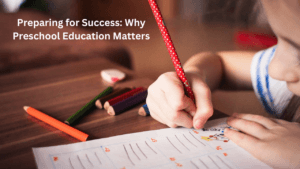Preschool is one of a child’s first experiences outside their comfort zone; Where they have to physically come out of their cocoon and face the real world. This period of transition from infancy to school age is called the early years and is a key part of their early years of development.
The best preschools in India ensure that they have nothing but the best faculty who are professionally trained and qualified, as they are equipped with the skills to integrate recreational activities with education.
The educational curriculum at the preschool, Grow Inn Steps, is designed to ensure the holistic development of children – from emotional development, interpersonal skills, and physical development to building the social quotient.
Preschool education plays a crucial role in a child’s overall development and sets the foundation for future academic success and lifelong learning. Here are several reasons why preschool education matters:
Cognitive Development:
Preschool provides a structured environment that stimulates a child’s cognitive development. Activities such as storytelling, puzzles, and educational games help enhance memory, problem-solving skills, and critical thinking.
Socialization Skills:
Preschool is often the first opportunity for children to interact with peers in a structured setting. Socializing with others helps develop important skills such as sharing, taking turns, and resolving conflicts – all essential for building healthy relationships.
Emotional Development:
Preschool fosters emotional development by helping children learn to express and manage their emotions. Teachers in preschools are trained to create a supportive and nurturing environment, which aids in building a child’s self-esteem and confidence.
Language Development:
Exposure to a language-rich environment in preschool contributes significantly to a child’s language skills. Children learn to communicate effectively, expanding their vocabulary and refining their language abilities through storytelling, songs, and conversations.
Early Literacy and Numeracy:
Preschool introduces basic concepts of literacy and numeracy, laying the foundation for future academic success. Children develop pre-reading and pre-math skills through activities that promote letter recognition, counting, and other fundamental concepts.
Independence and Self-Regulation:
Preschool provides an opportunity for children to learn to follow routines, take responsibility for their belongings, and develop a sense of independence. They also begin to understand the importance of rules and regulations within a community setting.
Preparation for Formal Education:
Early exposure to learning environments helps children adapt to formal education settings later on. They become familiar with the structure of a classroom, the role of a teacher, and the expectations of academic and social behavior.
Early Identification of Learning Disabilities:
Preschool teachers are often trained to identify signs of potential learning disabilities or developmental delays. Early intervention in such cases can significantly improve outcomes for children, providing them with the necessary support and resources.
Promotion of Curiosity and Creativity:
Preschools typically encourage exploration and creativity through various activities such as art, music, and play. This helps develop a child’s natural curiosity and fosters a love for learning.
Inclusivity and Diversity:
Preschools often promote an inclusive environment where children from diverse backgrounds interact. This exposure helps children develop an appreciation for diversity and understand different perspectives from an early age.
Investing in preschool education is an investment in the future success and well-being of children. It equips them with the foundational skills and attitudes necessary for a lifetime of learning and social interaction.
Get more info: https://www.growinnsteps.com/
